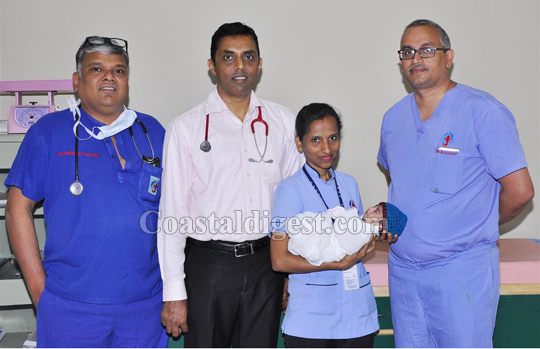Managluru, Feb 8: A 2-days old baby weighing 2.3 kgs was admitted to the NICU at A.J. Hospital & Research Centre in the city in Jan 2017. The baby was diagnosed with transposition of great arteries in the 5th month of pregnancy when a foetal Echo was performed by Dr Prem Alva, Children's Heart Specialist at AJ hospital, Mangaluru.

This is a condition where the 2 major blood vessels leaving the heart are connected to the wrong chambers of the heart thus the blood containing oxygen which is required to nourish the body goes back into the lungs instead, requiring urgent surgery.
Even though this condition accounts for approximately 5% of all children born with heart diseases, it is one of the few conditions that require surgery immediately after birth.
The parents counseled by Dr Gourav S Shetty Children's Heart Surgeon at AJ Hospital, Mangalore who has performed more than 200 surgeries of children over a period of 2 years in AJ Hospital explained why this procedure was complex and needed expertise.
It was carried out on a heart smaller than an egg, the 2 major arteries smaller than a little finger and the vessels supplying blood to the heart smaller than ball point refill, all these abnormally coming from the heart needed to be corrected.
After a successful surgery by Dr Gourav S Shetty & his team, Dr Gururaj Tantry,Chief Cardiac Anesthetist & Intensivist, Dr Suhas Anesthetist and his team then successfully managed the baby in ITU.
The baby was discharged on the 7th day from hospital. Follow up was a week later with a healthy baby and very happy parents.
A.J. Hospital & Research Centre is the only Centre in coastal region which has the expertise to conduct such complex surgeries even on the new borns.





Comments
Congratulation dr prem alwa.and dr gourav shetty..every one pray for him..allah bless u.
Dr.Gourav, I am proud to be your classmate
Congratulations
Congratulation Dr. Gourav S Shetty.
You Gave a New life to a new born Baby.
We wish you all the best.
Add new comment